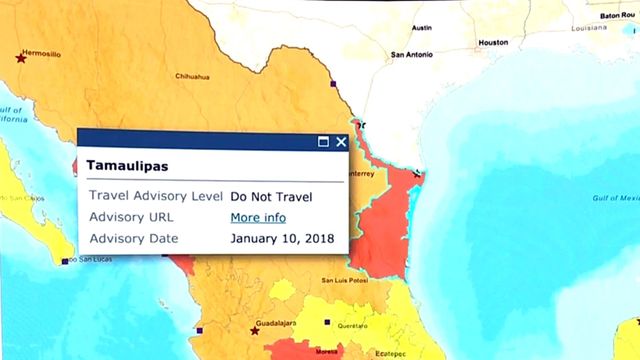Fact check: Are parts of Mexico as dangerous as Syria?
U.S. Rep. Mark Walker, a Greensboro Republican, tweeted that parts of Mexico are designated as dangerous as Syria. PolitiFact looked into the claim.
Posted — Updated“Thank you @realDonaldTrump. These cartels endanger Americans and threaten our country’s national security. The problem is so bad that @StateDept issued a “Do Not Travel” advisory to a Mexican state that has a 230m border with the US–the same designation as Syria,” Walker tweeted.
So we wondered whether the claim by Walker was true. And, from our research, he’s on point.
We analyzed Walker’s claim in three parts:
Did the U.S. government issue a "Do Not Travel" advisory for a Mexican state?
Did the U.S. government issue the same travel advisory for Syria?
And how long is that Mexican state’s border with the U.S.?
Travel advisories
The State Department labels the safety levels in foreign countries using a four-step scale:
1. Exercise normal precautions.
2. Exercise increased caution.
3. Reconsider travel.
4. Do not travel.
A ‘lawless’ border state
Only one state, Tamaulipas, shares a border with the United States, and it is known for being dangerous.
The Associated Press has described Tamaulipas as a "lawless border state." The State Department website says this about the area:
"Violent crime, such as murder, armed robbery, carjacking, kidnapping, extortion and sexual assault, is common. Gang activity, including gun battles and blockades, is widespread. Armed criminal groups target public and private passenger buses as well as private automobiles traveling through Tamaulipas, often taking passengers hostage and demanding ransom payments."
As it turns out, Tamaulipas has the same travel advisory as Syria.
Length of the border
Walker’s tweet about the length of the border – 230m – might give readers pause. The letter “m” is an abbreviation for a meter of length. A meter is about 39 inches. So, at first glance, one might think Walker was referring to a border slightly longer than two football fields.
But, given the U.S. isn’t on the metric system, it’s more likely that Walker was referring to miles. And indeed that was the case, according to spokesman Jack Minor.
(Quick fact: the correct abbreviation for a mile is “mi,” according to Dictionary.com.)
Our ruling
Walker said Mexican cartels are so bad that the U.S. “issued a ‘Do Not Travel’ to a Mexican state that has a 230m border with the US–the same designation as Syria.”
That state is Tamaulipas. It has the same “Do Not Travel” advisory warning as Syria. And the border is roughly 230 miles long. We rate this claim True.
• Credits
Copyright 2024 by Capitol Broadcasting Company. All rights reserved. This material may not be published, broadcast, rewritten or redistributed.





